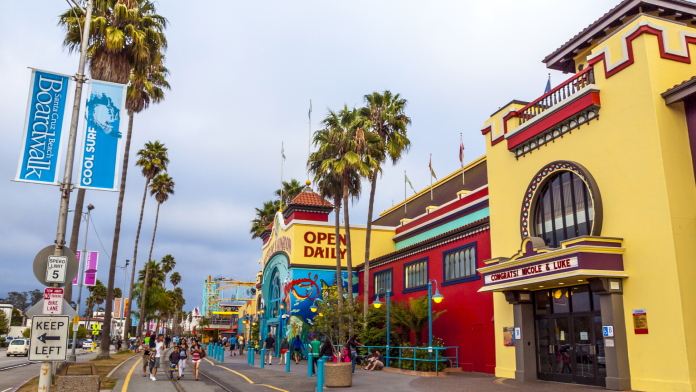Drug and Alcohol Statistics in Santa Cruz
Santa Cruz collects a lot of data on how drugs and alcohol impact its residents’ lives. The latest surveys show that 2.3% or 5,547 residents have a substance use disorder.2 In addition:3
18.8% of adults binge drink
30.9% of driving deaths involved alcohol
For every 1,000 Santa Cruz County residents, there are:3
50.5 prescriptions for buprenorphine per 1000 residents
325.5 prescriptions for opioids per 1000 residents
Emergency departments at local hospitals treat drug and alcohol overdoses daily. For every 100,000 Santa Cruz County residents, there are:3
110 overdoses of any drug
6.6 overdoses of heroin
21.9 overdoses on opioids other than heroin
An unfortunate fact is that most people with a substance use disorder are not getting treatment despite free and low-cost drug rehab availability in Santa Cruz. There are options for inpatient or outpatient detox, peer recovery, therapy, and more from an accredited facility.
Levels of Care for Substance Abuse
Multiple levels of care exist for alcohol and drug rehab in California. Some residents require all levels of care during their journey to recovery, while others receive only the less intensive options.
Medical Detox
Detox is the process of safely and comfortably removing drugs or alcohol from your system while in a supervised medical setting. Many people choose a medical detox program to prevent severe withdrawal symptoms. This is often the first step in the recovery process, completed before transitioning into formal inpatient addiction treatment services.
Inpatient Care
An inpatient or residential setting involves living at an accredited rehab facility 24/7 to receive treatment for addiction. A combination of evidence-based interventions are provided, including individual and group therapy, nutritional counseling, and medication administration.
Partial hospitalization programs (PHPs)
PHPs are a type of outpatient treatment in California that often involve many of the same therapies and methods of inpatient care. The difference being that you only visit the drug rehab during scheduled session times, then you can return home.
Intensive Outpatient Programs (IOPs)
A step down from PHPs, IOPs are a type of outpatient treatment in California allowing you to attend onsite sessions for several hours a day, multiple days each week, while spending the rest of your time at home, working, or fulfilling other obligations.
Standard Outpatient
As the least intensive setting, standard outpatient care is appropriate for California residents who are highly motivated and have a strong support system. It involves just one or two hours of treatment per week.
Relapse Prevention
Aftercare, or relapse prevention, provides ongoing support after a rehab program is complete. Aftercare may include 12-step groups, non-12-step groups like SMART Recovery, ongoing therapy, sober living homes, and more.
How to Pay for Substance Abuse Treatment in California
Private Insurance
Every insurance provider in the U.S. is required by law to provide at least some coverage for mental health and substance abuse treatment. In California, residents should contact their insurance provider to confirm specific coverage with their carrier, including applicable copays.
Medi-Cal
Medi-Cal is California’s Medicaid program. Funded by federal and state taxes, this program pays for medical services for children and adults who have limited income. To qualify for Medi-Cal, California residents must meet income requirements and be one of the following: pregnant, responsible for a child under 21 years old, blind, disabled or a family member of someone who is disabled, or 65 years or older.
California Medicare
California Medicare is a government program providing coverage to residents who are over the age of 65 or who have end-stage renal disease. California residents can use Medicare to cover the cost of rehab and other addiction treatment services; however, not all rehabs accept Medicare insurance.
Sliding Scale Payment Options
Sliding scale payment plans only charge California residents what they can afford, based on their income. To qualify, residents typically need to provide proof of income and assets.
TRICARE in California
California TRICARE (West Region) is a government program that provides health insurance for military personnel, veterans, and their dependents. TRICARE coverage includes addiction treatment services, such as rehab and medication-assisted treatment (MAT).
IHS-Funded Drug Rehabs
Drug rehab programs funded by the Indian Health Service provide free addiction treatment to California Natives and Indigenous peoples in the U.S.
Traveling to and Within Santa Cruz

Entering treatment in a different city or state has advantages, such as getting away from the people, places, and things that make it hard to maintain recovery. In addition, getting a fresh start in a new location can mean focusing on building a new, healthier life without distractions.
If you choose a Santa Cruz drug rehab, you will find it accessible and surrounded by hundreds of enjoyable, wholesome activities that support you throughout your journey.
Getting to Santa Cruz may start with an airline flight to the San Francisco International Airport. From there, it is an hour’s drive to a drug and alcohol rehab in Santa Cruz. You can choose from the following:
- Rental cars
- Ride-share programs like Uber and Lyft
- Airport shuttles
- Bus rides on the Santa Cruz METRO
- Pay-for-use vehicles through Zip car rentals
Finding a place to stay near a Santa Cruz drug rehab is easy since there are more than 100 lodging options. They include:
- Hotels
- Motels
- Resorts
- Inns
- Bed and breakfasts
- Farm stay
- Airbnb and VRBO
- RV and campgrounds
While participating in a drug and alcohol rehab in Santa Cruz, you will have time for yourself and for friends and family who visit. Hundreds of local activities allow you to work on your physical and mental health while having fun.
- Art: galleries, festivals, and classes
- Water: beaches, sailing, kayaking, and surf schools
- Self-Care: counseling, churches, mindfulness, support groups, massage, acupuncture
- Hobbies: ceramics, dance, fitness, crafts, golf, and shopping
Santa Cruz drug rehabs are a great place to start your recovery journey.
California Alcohol and Drug Laws
California law includes the following policies related to substance abuse:1,2,3,4,5
California Employee Protections for Drug or Alcohol Rehab: California’s labor code requires employers with 25 or more employees to provide accommodation to staff who voluntarily choose to attend alcohol or drug rehab. This may include unpaid time off or use of sick or vacation time. Employees who wish to request time off for addiction treatment may be able to request it under the Family and Medical Leave Act or the California Family Rights Act.
Substance Abuse and Crime Prevention Act: This act provides treatment opportunities for individuals who are convicted of non-violent crimes. Eligible offenders may serve their time in drug treatment rather than in prison.
California Government Prevention and Care Services: Senate Bill 110 expanded these services to include contingency management (an incentivized treatment program) as a benefit covered under Medi-Cal. Patients who demonstrate substance-free behavior, such as drug-free urine tests, are rewarded with vouchers or gift cards.
California Ethical Treatment for Persons with Substance Use Disorder Act: This bill protects residents undergoing addiction treatment by requiring alcohol and drug rehabs in California to adopt a client bill of rights that seeks to ensure every client is treated with dignity, honesty, and respect.
California’s Good Samaritan Law: This law encourages California residents to call 9-1-1 if an overdose is suspected. It protects individuals who seek emergency medical care for overdose from legal repercussions for possession of a controlled substance/drug paraphernalia or providing alcohol to minors.
Resources
- California Department of Health. 2021. California Overdose Surveillance Dashboard Santa Cruz County.
- Santa Cruz County. 2021. California Opioid Use Disorder and Treatment Need 2019.
- DataShare Santa Cruz County. 2022. Community Well-Being Dashboards.



